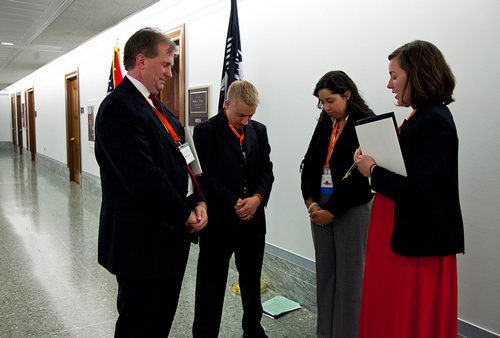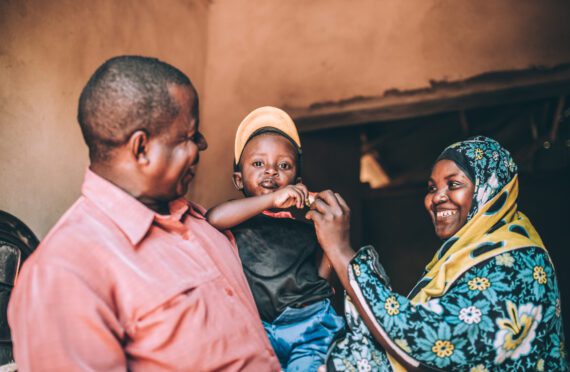This story is featured in the 2019 Hunger Report: Back to Basics
In 2016, Congress passed the Global Food Security Act (GFSA), which strengthened U.S. commitment to reducing hunger and authorized additional resources to improve agriculture, particularly for farmers who rely on small plots of land for their living. Behind the scenes, Bread for the World’s advocacy was instrumental in securing congressional support for bringing the bill up for a vote and passing it. Smallholder farmers have been a focus of Bread’s work since our founding in 1974.
The support of individual members of Congress is critical to enacting legislation. Every year in both the House and the Senate, hundreds of legislative bills are introduced, assigned a bill number, and then never put to a vote. Because members of Congress cannot study all these proposals, they often decide on their position based on a bill’s list of cosponsors, who are other members of Congress willing to endorse the bill. Often, it falls to advocacy groups such as Bread for the World to bring specific bills to the attention of members of Congress and ask them to cosponsor. If a bill has a strong list of cosponsors, Senate and House leadership are far more likely to schedule it for a floor vote.
One of the hallmarks of Bread for the World’s advocacy has always been its personal touch. To many people on Capitol Hill, stacks of handwritten letters delivered by hand to congressional offices mean “Bread for the World.” Bread advocates have a mission: making hunger a legislative priority. Soon after the bill was introduced in 2015, Bread’s members and staff began visiting House and Senate offices both in Washington, D.C., and in members’ districts. This effort continued into 2016.
Longtime Bread for the World member Rev. Ron Neustadt, a retired Lutheran minister in Beltsville, Illinois, reached out to his newly elected representative, Mike Bost (R-IL-12). Because the representative had minimal experience in global hunand poverty issues when he was elected in 2014, it was an opportune time to brief him on how he could help reduce hunger and malnutrition. Neustadt made persistent efforts to explain why GFSA was important to Bost’s constituents. He was able to make connections between farming in Bost’s district, which is largely agricultural, and the efforts of smallholder farmers in developing countries. Bost ultimately became a cosponsor of GFSA.
GFSA had 112 House and Senate cosponsors when it came up for a vote. Bread advocates had helped secure more than half of them. In the summer of 2016, GFSA passed in both the House and Senate with overwhelming bipartisan support. Once a bill has been enacted, it is generally much easier to get it reauthorized. GFSA was reauthorized in 2018.
GFSA requires the government to coordinate its anti-hunger initiatives and make efforts to avoid the problems associated with planning projects in isolated “silos.” GFSA also authorized spending $1 billion a year on efforts to reduce hunger by focusing on its longer-term causes.
Once GFSA became law, the administration’s new Feed the Future food security initiative began to support efforts to reduce communities’ vulnerability to hunger. To do this, it puts its focus on agricultural growth, increased farmer productivity, and improved nutritional quality, particularly for pregnant women and children younger than 2. Feed the Future reports that in the countries where it works, 5.2 million fewer families are going hungry now, and 3.4 million children to date have been spared childhood stunting.
Feed the Future also supports governments in investing more of their own resources in agriculture. In 2018, USAID Administrator Mark Green reported an average increase of 25 percent in the agriculture budgets of countries where Feed the Future works.
Bread’s organizing team supports advocates in their efforts to communicate with their members of Congress. Zach Schmidt has been a Bread organizer since 2008. His portfolio includes Illinois, and he helped put Rev. Neustadt in touch with Bost’s office. “It’s a testament to the effectiveness of Bread’s strategy,” said Neustadt of his success in winning Bost’s cosponsorship of GFSA.
Schmidt describes the passage of GFSA as the most gratifying experience of his work at Bread. “It’s been empowering for Bread members,” he explained. “They know they have impact, but GFSA shows it. Advocacy does work.”
“Bread members know they have impact, but GFSA shows it. Advocacy does work.”



